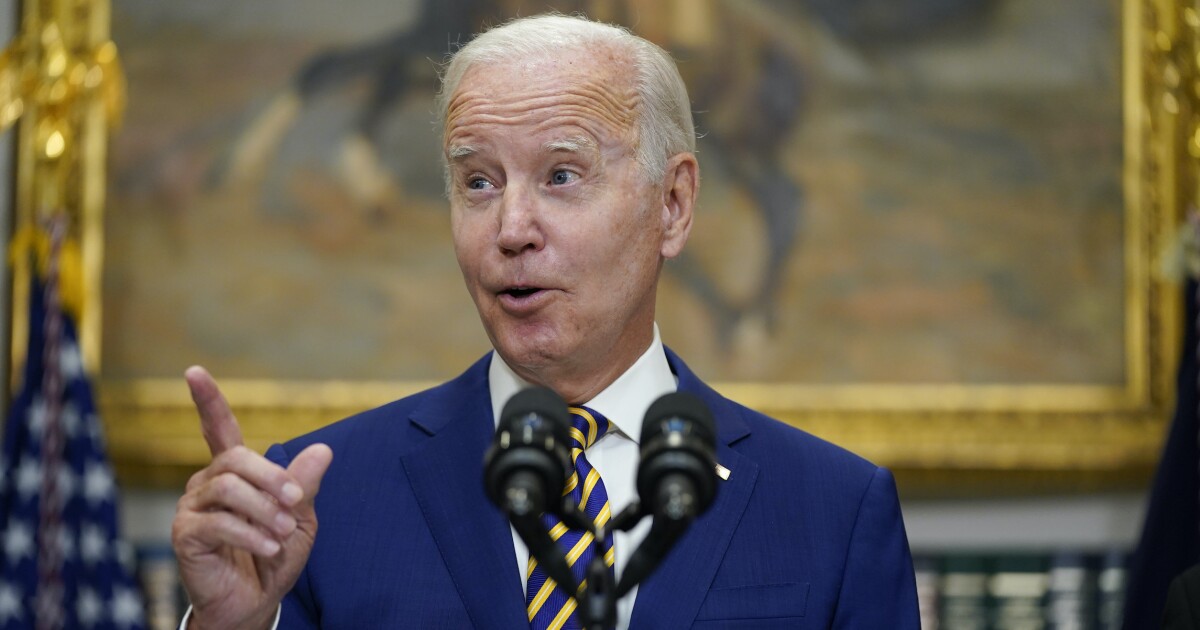

Democrats’ responses to President Joe Biden’s executive action on student loan forgiveness have ranged from varying levels of support to outright opposition to the move.
CAN CHARLIE CRIST CONVINCE FLORIDA OF HIS ‘PRO-CHOICE’ BONA FIDES?
The Biden administration announced this week a plan to eliminate $10,000 of student loans per borrower for individuals making under $125,000 or $250,000 for married couples, as well as $20,000 for Pell Grant recipients.
Congressional leadership and Biden allies hailed the move as another win for the president, giving his party some much-needed momentum going into November’s midterm elections.
Kevin Walling, a Democratic campaign strategist and former Biden campaign surrogate, told the Washington Examiner, “Student loan forgiveness was something President Biden ran on during the 2020 race, and he is delivering on that campaign promise.”
In a joint statement this week from Senate Majority Leader Chuck Schumer (D-NY) and Sen. Elizabeth Warren (D-MA), both proponents of broad student loan debt cancellation, praised Biden’s order as “a giant step forward in addressing the student debt crisis by canceling significant amounts of student debt for millions of borrowers.”
“No president or Congress has done more to relieve the burden of student debt and help millions of Americans make ends meet,” Schumer and Warren said. “Make no mistake, the work, our work, will continue as we pursue every available path to address the student debt crisis, help close the racial wealth gap for borrowers, and keep our economy growing.”
Some congressional progressives had pushed for student debt forgiveness even during Biden’s candidacy and sought up to $50,000 in student loan forgiveness, while others, including Sen. Bernie Sanders (I-VT), had pushed for complete student loan forgiveness. Sanders said in a statement that the move is “a big deal” but that “we have got to do more.”
“If the United States is going to effectively compete in the global economy, we need the best-educated workforce in the world, and that means making public colleges and universities tuition-free as many other major countries currently do — and that includes trade schools and minority-serving institutions as well,” Sanders said.
But some centrists and candidates in swing states were more hesitant or outright opposed to Biden’s announcement, where some seemed to fear the move wouldn’t play politically with working class or non-college-educated voters. Sen. Catherine Cortez Masto (D-NV), up for reelection in November, and Rep. Chris Pappas, a Democrat from a swing district in New Hampshire, were among those who issued statements critical of the plan.
One swing-state candidate opposed to the move was Rep. Tim Ryan (D-OH), who is running against Republican candidate J.D. Vance in a close contest for Ohio’s open Senate seat, a state where winning the support of working-class voters will be crucial. Ryan said the move helps those already on “a trajectory to financial security” over low-income voters.
“As someone who’s paying off my own family’s student loans, I know the costs of higher education are too high,” he said in a statement. “And while there’s no doubt that a college education should be about opening opportunities, waiving debt for those already on a trajectory to financial security sends the wrong message to the millions of Ohioans without a degree working just as hard to make ends meet.”
But another Democratic strategist who spoke with the Washington Examiner offered praise for Biden’s plan and said voters will agree.
CLICK HERE TO READ MORE FROM THE WASHINGTON EXAMINER
“It’s a winning message and should be embraced by Democrats,” Chris Hahn, host of the Aggressive Progressive podcast and a former aide to Schumer, told the Washington Examiner.
Hahn also argued the move shows Biden is “keeping his promises.”






